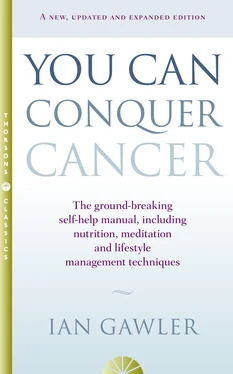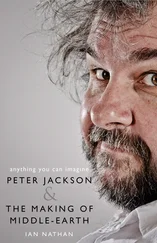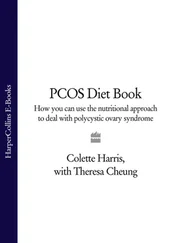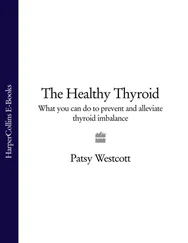Alternative Medicine
Alternative medicine is the term widely used by many medical authorities to describe modalities that they regard as being on the periphery, being unproven and unwelcome. We will investigate what all these different modalities have to offer in the later chapter on healing.
What is helpful to understand now is that all four—conventional, complementary, traditional and alternative medicine— generally involve seeking help from the outside and having things done to or for you. This makes good sense. You go to a surgeon, massage therapist or acupuncturist for the help they can provide. You take the drugs, herbs or supplements recommended for you and receive their benefits. You have things done to or for you. But then there is another completely different possibility—what you can do for yourself.
Lifestyle Medicine
Lifestyle medicine focuses on what you can do for yourself in the context of your daily life. This is what we focus upon in this book. Lifestyle medicine can be highly therapeutic. It can improve your quality of life and increase your chances of long-term survival dramatically.
Lifestyle medicine involves attending to physical, psychological, social and spiritual factors. The actual techniques include nutrition, exercise, sunlight, stress management, social support, emotional health, the power of the mind, relaxation, imagery, mindfulness and meditation.
It is strongly recommended that anyone diagnosed with cancer attend to their lifestyle right from the start. If you have conventional treatment, lifestyle medicine is likely to minimize any side effects and maximize the benefits. If no curative conventional medical treatment is available, then lifestyle medicine still offers real hope.
Integrative Medicine • Finding a Suitable Doctor
It is worth emphasizing one more term: integrative medicine.
Integrative medicine refers to a style of medical practice that is holistic and integrates the best and safest of conventional medical care with lifestyle advice and evidence-based complementary medicines and/or therapies. It aims to use the most appropriate of all available modalities and to help each individual patient make informed choices. Integrative medicine is an umbrella term that aptly embraces all styles of medical practice, including lifestyle medicine.
Integrative medicine is becoming a major specialty and many doctors now describe their approach to health, healing and well-being as being integrative. Simply put, perhaps this is what good medicine has always been—taking full regard of the patient as a whole and working collaboratively with a comprehensive range of allied health professionals.
When seeking a medical practitioner to head your healing team, a good starting point would be a doctor who is an advocate of integrative medicine, and preferably a member of an integrative medical association.
Most people start their cancer journey by consulting a doctor. So now, let us take a logical approach and consider how to manage diagnosis, prognosis and treatment options.
Start at the Beginning • Seek an Accurate Diagnosis
Diagnosis is something modern medicine is very good at. Establishing whether you have cancer or not, what type it is, where it is, how extensive it is—all these facts modern medicine generally gets right. Sure, as in anything, mistakes sometimes are made, and particularly in unusual cases second opinions may be worthwhile, but generally the diagnosis can be taken as a fact and as such warrants being accepted.
The Reaction to a Diagnosis of Cancer
Some people accept a cancer diagnosis quite calmly, but I have seen people of all ages and from all walks of life go into deep shock on hearing the fateful words: “You have cancer.” A strong emotional reaction is common, completely understandable and needs to be taken in context. Quite often the reaction is one of disbelief and numbness. Sometimes an outpouring of grief. Often confusion, uncertainty and fear. While any or all of these are understandable and common, none of them are good states of mind to be in when making important decisions.
A strong word of advice: Following a diagnosis, give time to adjust emotionally and take your time before making any major decisions. Contrary to common belief, there are very few decisions in cancer medicine where waiting to make them, waiting to act for a week or two, will affect the overall outcome. Many people think that the need to receive treatment for cancer is like when you are hemorrhaging—it needs to be done now, as soon as possible. While it is sometimes true that there can be medical emergencies involved that do demand urgent attention, in the main, a short delay of a week or two will not affect the long-term outcome. Taking your time could have you in a far better state of mind to make crucial decisions and to work well with the treatments you do accept.
This then is a time to be close to family and good friends, particularly those who have the capacity to stay present and offer their stability amid turbulent emotions. Here it is important not to be confused. Many people think the need is to be “positive,” which is true, but some think to be “positive” is to be unemotional, which is not true. I have met people who were so afraid of their emotions that they thought it was almost as if they were to cry even once, it would take a week or two off their lives. Of course if one were to cry all day, every day, that may well be a problem, but it would be perfectly natural and normal to have a few, tough emotional days as you take in a cancer diagnosis and what it means for your life and the lives of those around you.
What to Do with the Emotions
Healthy emotions are natural emotions. Unhealthy emotions are when wild emotions control you, or, as is often the case with people affected by cancer, when emotions are suppressed.
Everyone feels emotions. It is how we express them that is the issue. The observable fact is that people vary quite naturally in their range of emotional expression. Some are naturally very expressive, some quite reserved. This is influenced by a variety of factors. Some cultures are very emotionally expressive—Italians often come to mind in this regard. Some keep their emotions under pretty tight control—my culture of origin, the English, seem pretty good at this.
The point is, with emotions, as with all else, individuals do vary. Your aim is to be authentic. To allow yourself to be natural and to be comfortable with your own emotional expression.
Emotions are so important we have two specific chapters on them later, but for now, recognize that allowing your natural emotions to flow is natural, normal and healthy. While the emotions that result from a cancer diagnosis may be painful, do what you can to let them out, either on your own or in the company of those you trust. Once they have been released, it will feel like a real weight has lifted and you will be in a much better place to move on with treatment, using your own resources and taking the steps to recovery.
If you are in doubt about your emotions, if none come or if they seem to be going on forever, do be brave. This is a time to seek help, talk with a professional counselor or an experienced, trusted friend and check your situation out.
Experience says it is very difficult to think clearly, to make good decisions, to really commit to what you need to be doing, if your emotions are all over the place. Once the immediate emotional response to a diagnosis is felt, expressed, and showed, usually the intensity goes out of it. Maybe emotions will arise again in the future. Again that would be natural and normal. But be authentic. Be comfortable with your own degree of emotional expression and realize emotions are another natural part of a healthy life.
So do take time. Sit with those you are close to. Be with them. Maybe in silence. Maybe with tears. Maybe with talking and discussion. Take it in. Let it out. Allow yourself to settle. And then begin to plan. To move forward again.
Читать дальше












